Civil Rights and Liberties
5.0(2)
Card Sorting
1/37
Earn XP
Last updated 3:15 PM on 4/26/23
Name | Mastery | Learn | Test | Matching | Spaced | Call with Kai |
|---|
No analytics yet
Send a link to your students to track their progress
38 Terms
1
New cards
Civil Liberties v. Civil Rights
\-Civil Liberties: the legal protections and treatment of citizens
\-Civil Rights: the personal freedoms protected from government intrusion
\-Civil Rights: the personal freedoms protected from government intrusion
2
New cards
Civil Liberties protected by the Bill of Rights
speech, religion, press, assembly, and the right to petition the government.
3
New cards
When the Bill of Rights was ratified in 1789, the amendments protected civil liberties infringement from which levels of government?
The federal/national government
4
New cards
what is the free exercise clause of the 1st amendment?
protects citizens' right to practice their religion as long as the practice does not run afoul of a "public morals" or a "compelling" governmental interest.
5
New cards
What happens when rights conflict with each other?
Mediation is needed to find a fair resolution. The court comes to a decision based on each case.
6
New cards
How does the government balance individual rights and government interests?
They create policies/laws to promote public safety and they enforce the due process clause.
7
New cards
Civil Rights are relative NOT. . .
absolute
8
New cards
Majority and minority rights
The government carries out the will of the majority but also takes the wants of the minority into account
9
New cards
what is affirmative action?
a program of positive action, undertaken with conviction and effort to overcome the present effects of past practices, policies, or barriers to equal employment opportunity and to achieve the full and fair participation of underrepresented group
10
New cards
what is Double jeopardy clause?
a clause in the 5th amendment that prevents the prosecution of a person twice for the same offense.
11
New cards
What is the USA Patriot ACT?
It gave the government new tools to detect and prevent terrorism. The government could look through people’s credit cards, social media, and other online data.
\-There was large controversy with this ACT, stating that it violated the 4th amendment (unreasonable search)
\-There was large controversy with this ACT, stating that it violated the 4th amendment (unreasonable search)
12
New cards
Correlation between Due process and the rights of the accused?
Due Process ensures that the government does not act unjustly and that individual rights are protected against government infringement.
13
New cards
Correlation between Due process and the right to privacy
Due process protects rights that are not specifically listed in the Constitution, such as the right to privacy.
(i.e: In Roe v. Wade (1973), the Court ruled that this right to privacy included a woman's decision to have an abortion)
(i.e: In Roe v. Wade (1973), the Court ruled that this right to privacy included a woman's decision to have an abortion)
14
New cards
What is the establishment clause of the 1st amendment?
The Establishment clause prohibits the government from "establishing" a religion.
15
New cards
What is freedom of speech and it’s limitations
a right that allows an individual or a community to express their opinions/ideas without fear of retaliation, censorship, or legal sanction.
\-limits: if a clear and present danger is created by the speech (i.e yelling fire on a plane or in a movie theater)
\-limits: if a clear and present danger is created by the speech (i.e yelling fire on a plane or in a movie theater)
16
New cards
What is the 2nd amendment?
All US citizens have the right to bear arms (to encourage militia)
17
New cards
What is the 4th amendment?
Prohibits unreasonable search and seizure
18
New cards
What is the Exclusionary rule of the 4th amendment?
Prevents the use of evidence gathered in unreasonable search and seizure to be used against a person
19
New cards
What is happening in the political cartoon?
Police officers are taking apart a car
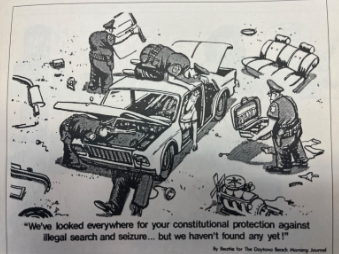
20
New cards
Why are they taking it apart?
There are trying to look for evidence
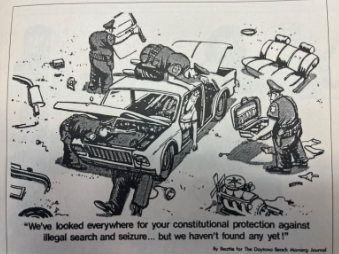
21
New cards
What does the caption indicate?
It indicates that the police officers are search the car in hopes of finding incriminating evidence.
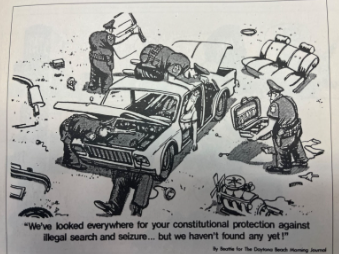
22
New cards
What is the message of the Political Cartoon?
The Police force often disregards the 4th amendment when it comes to automobiles?
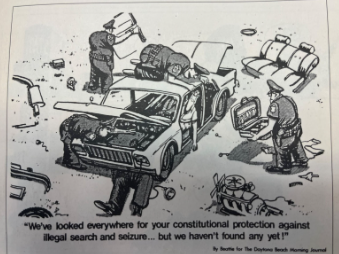
23
New cards
What is difference between a search in an automobile and a fixed search?
Searches in automobiles may be done without warrant if an officers has a valid reason to believe a car is part of a crime because the car can be moved to a place to dispose of evidence.
A house must have a warrant.
A house must have a warrant.
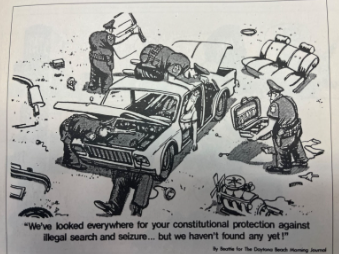
24
New cards
Does the cartoonist believe the 4th amendment applies to automobiles?
Yes because the cartoonist emphasizes that the police search in the photo is illegal

25
New cards
How does state’s power to restrict individual liberty?
A state can restrict civil liberties if it puts public safety at risk (gun laws to prevent mass shootings).
26
New cards
What is the 8th amendment?
Prohibits excessive bail and cruel and unusual punishment
27
New cards
What is Selective incorporation of the 14th amendment?
A practice of the federal government to prevent states from enacting laws that violate some of the basic rights of American citizens. (i.e preventing states from allowing the unlawful arrest of citizens)
28
New cards
What is the due process clause of the 14th amendment?
A clause that acts as a safeguard from denial of life, liberty, or property by the Government outside the sanction of law nor deny anyone the equal protection of law.
29
New cards
What was Engel v Vitale (1962)?
Outcome: school-sponsored prayer in public schools violated the establishment clause of the First Amendment.
Impact: struck down prayer in public schools.
Impact: struck down prayer in public schools.
30
New cards
Schenck v US (1919)
Verdict/Outcome: affirmed that Schneck’s conviction of violating the Espionage Act of 1917
Impact: Limits speech that creates a clear and present danger
\
(1st amendment)
Impact: Limits speech that creates a clear and present danger
\
(1st amendment)
31
New cards
Tinker v DesMoines (1969)
Verdict/Outcome: school officials cannot censor student speech unless it materially and substantially disrupts the educational process
Impact: extended freedom of speech to schools and workplaces
\
(1st amendment)
Impact: extended freedom of speech to schools and workplaces
\
(1st amendment)
32
New cards
NYT CO v US (1971)
Verdict/Outcome: The Court ruled that the intent of the publication was not to put the U.S. in danger but to educate the American people about the Vietnam War.
Impact: Prevents the government from censoring the press and prevents the government from punishing the press for releasing information to the public (for education purposes)
\
(1st amendment)
Impact: Prevents the government from censoring the press and prevents the government from punishing the press for releasing information to the public (for education purposes)
\
(1st amendment)
33
New cards
DC v Heller (2008)
Verdict/Outcome: D.C.'s handgun ban, along with the requirement that firearms in the home be kept nonfunctional, violated the 2nd amendment .
Impact: protects an individual right to possess firearms
Impact: protects an individual right to possess firearms
34
New cards
McDonald v Chicago (2010)
Verdict/Outcome: guaranteed the 2nd amendment be applied to state and local government in addition to federal government
Impact: extend the 2nd amendment right to non militia purposes such as self defense
Impact: extend the 2nd amendment right to non militia purposes such as self defense
35
New cards
Shaw v Reno (1993)
Verdict/Outcome: redistributing on the basis of race is unconstitutional
Impact: limited gerrymandering in the creation of majority and minority districts
(equal protection of 14th amendment)
Impact: limited gerrymandering in the creation of majority and minority districts
(equal protection of 14th amendment)
36
New cards
Gideon v Wainwright (1963)
Verdict/Outcome: guaranteed the right to legal counsel for criminal defendants in federal and state courts.
Impact: states must provide attorneys to defendants who cannot afford one.
(6th amendment)
Impact: states must provide attorneys to defendants who cannot afford one.
(6th amendment)
37
New cards
Grutter v Bollinger (2003)
Verdict/Outcome: upheld the affirmative action admissions policy of the University of Michigan Law School.
Impact: allowed universities to consider race as one of the many factors in context of considering an applicant
\
(equal protection of 14th amendment)
Impact: allowed universities to consider race as one of the many factors in context of considering an applicant
\
(equal protection of 14th amendment)
38
New cards
Brown v Board of Education
Verdict/Outcome: the Supreme Court ruled that separating children in public schools on the basis of race was unconstitutional
Impact: struck down segregation in the school system
(equal protection of 14th amendment)
Impact: struck down segregation in the school system
(equal protection of 14th amendment)